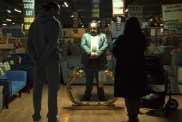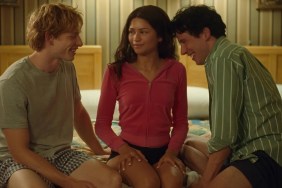You wouldn’t think that someone like Ben Stiller, who has literally spent decades in the business both in front and behind the camera, would have anything to prove at this point, but there are some people out there who still aren’t able to take him seriously as a filmmaker due to the choices he makes as an actor.
Hopefully that will change with his decision to tackle The Secret Life of Walter Mitty, the James Thurber short story that was turned into a famous Danny Kaye movie in 1947. Stiller’s take on the premise of a daydreamer who can’t quite seem to live in reality is given a uniquely modern and timely spin with Stiller playing Mitty, a photo editor at the soon-to-be-retired LIFE Magazine who has a thing for his co-worker Cheryl, played by Kristin Wiig, though his attempts to ask her out rarely rise above fantasy. When an important negative by an eclectic photojournalist (Sean Penn) goes missing, Walter has to avoid being fired by his horrible new boss (Adam Scott) and venture out into the real world to find the missing negative.
It’s a gorgeously-shot film with about 50% of it shot in the heart of New York City and the other half in remote places like Greenland and Iceland, but it’s the brilliant blend of humor, drama, romance and big screen adventure that makes Stiller’s “Mitty” something really special. (In fact, the movie happens to be this writer’s #1 movie of the year, as you can see by reading The Weekend Warrior’s Top 25 of 2013.)
ComingSoon.net had a chance to get on the phone with Stiller to talk about some of the movie’s more exciting moments, his future aspirations as a filmmaker, as well as talking briefly about returning for Night at the Museum 3, which will be Stiller’s sixth Christmas release (if you include Wes Anderson’s The Royal Tenenbaums.)
ComingSoon.net: I’m a pretty big fan of the original short story and the ’40s movie with Danny Kaye, but I was really impressed with what you did with the source material. I know you’ve been trying to revive and update the Thurber story for a long time, so what spoke to you about the material? Were you a fan of the original short story or the movie?
Ben Stiller: You know, I’d seen the movie on television I think, but I didn’t know the movie really that well. I’d read the short story when I was in school, but to be honest, I got sent a script of it about nine years ago that was sort of remaking the original movie. It was okay, but I went and looked at the original, and I realized that movie is sort of its own thing. It’s a sort of classic musical comedy and made in that era when they were making those movies very well and I felt like there wasn’t really a way to improve on that. It wasn’t until I read Steve Conrad’s script that I really got excited about it because I felt like it captured the tone of the story and that idea of a guy who? obviously, it’s an iconic idea of the daydreamer, but what I really liked about Steve’s script was it was very personal and it felt to me more of a character movie and more about a guy who is trying to connect with himself and trying to realize this version of himself that was inside that existed inside, but he couldn’t be on the outside in that journey. That was really what was interesting to me.
CS: At one point, Mike Myers was attached and wanted to do it as well, so did he just decide not to do it leaving it open for you?
Stiller: I had no idea. I’ve been doing a lot of interviews where people are saying, “Oh, you know, Jim Carrey was going to do it, Steven Spielberg was going to do it.” I really had no idea. I mean, I knew it had been around for a long time, but to me, it was really when I got Steve’s script and I started to talk to Steve about it and I got excited about it. I really wasn’t thinking about who had attempted it before because I felt like Steve’s thing was sort of its own unique entity.
CS: Like you say, it’s an iconic premise because everyone daydreams to some degree–everyone has these fantasies. I’m actually surprised it took so long to make a movie because for instance, I loved Terry Gilliam’s “Brazil” and thought that was an amazing take on that idea.
Stiller: Well, I think sometimes when there are stories like that that you can call iconic that create sort of this archetype that then gets used and people do base movies and stories off of it, I feel like that’s kind of the same thing with Budd Schulberg’s with “What Makes Sammy Run?,” that he created that character as sort of the guy would do anything to get ahead. Then, there were so many movies and shows and characters based off of that, not ripping off, just inspired by that prototype. I feel like that’s sort of what happened with Mitty, too.

CS: At one point you going to do something with that book, weren’t you? Is that something you were going to do at one point?
Stiller: Yeah, yeah, yeah. You know, but even from the very beginning, that idea had been done in different ways, and going back to a Kirk Douglas movie called “The Bad and the Beautiful” would take that idea, too. So, with “Mitty,” I felt like since that original movie had been made–and the original movie doesn’t really relate to the story that much at all–and that’s what I also liked about Steve’s script, because I just felt like he was sort of going more for a tone that was closer to the story.
CS: Obviously, the fantasy sequences, at least in the first half of the movie, are pretty extravagant with full on street chases and fights with Adam Scott. Was a lot of that in Steve’s original script? Do you read a script like that and wonder how you’re going to recreate that on the streets of New York?
Stiller: Yeah, that was sort of developed. What happened was, Steve and I got together and he had so much great stuff in the script and I just wanted to kind of go through with him and basically try to work on the story a little bit more and figure out how to make everything sort of be a little more cohesive in telling Walter’s story and the themes. Besides the love story, there were a few different things going on in the movie, but there’s sort of this love story with Cheryl, who he’s trying to connect with and then this journey out into the world and the issues with his boss. It was a process of trying to focus the fantasies more and more in a more specific way to what was going on in Walter’s relationship with Cheryl and his development of trying to finally get to the point where he kind of goes out and jumps on the helicopter. We went through a lot of different versions of different fantasies, and that idea was always in there, like this sort of epic fight with his boss, but really, we started to go down different roads of what it could be, and stylistically, what it could be. Jeff Mann, a production designer who’s a really good friend of mine, and Steve and I sat together and just drew out a lot of different ideas and that’s how we sort of hatched that idea. It came out of wanting to figure out a way to do some sort of a superhero type battle that was maybe a little bit different than what we’d seen before that would somehow relate to Walter’s skateboarding past. We sort of developed some storyboards first, and then, we started sort of rewriting it based on the storyboards we were coming up with, and then we did a pre-vis, so it kind of became its own thing. That happened with a bunch of the fantasies as we went along; we really focused them more on the story more and more.
CS: Obviously, you’ve filmed in New York a lot, both as an actor and director, but how do you go about closing down major areas of Manhattan like you did for this? I thought you’d need a “Spider-Man 3”-like budget to do that sort of thing.
Stiller: That part of the movie, definitely, that was its own not-so-little movie, you know? (Laughs) It was basically the movie that we shot on the weekend, because we could only shut down the streets on Saturdays and Sundays. We would go onto 5th Avenue on 57th Street. It was much bigger when we first pre-vised it, and then we had to bring it down because of the budget, then we eventually ended up editing it down in the movie just for pacing, but we spent about seven or eight weekends, I think, shooting that sequence, and it was really fun because we were doing as much stuff for real as possible, and then, sort of adding in later with CG all of the tracks and the boards. But I was on a skateboard and Adam was on rollerblades and we had a really good time doing that stuff in the real environment and sort of living up a fantasy of shutting down 5th Avenue and skateboarding down the middle of it, which was really fun.
CS: David Bowie’s “Major Tom” also plays a pretty significant role in the movie. When you had that in the script, did you have to make sure you could use that song before you carried on? Obviously, it just starts out as a jab made at Walter by his boss but then it turns into a major plot point.
Stiller: Yeah, no, I mean, I had to make sure that we had it. There were a bunch of things we needed to get the rights to before we could make the movie. We needed LIFE Magazine…
CS: Oh, of course.
Stiller: That’s a huge thing. That took a little bit of wrangling, then we needed to get Bowie’s permission for “Major Tom,” and that actually came a little bit later in the development of the script, too. We were trying to figure out how to, again, sort of have this melding of Walter’s relationship with Cheryl and the moment where he actually jumps onto the helicopter. All of those come together in terms of her sort of inspiring him to do it, and then, also having it be sort of a movie moment that we wanted to feel like there was a moment of him saying goodbye to his fantasies. He still has one later on, but it’s just sort of a moment where that fantasy’s pushing him out into reality. So when that idea came up later in the process, we were really excited by it, and then we just had to go out and get the permission and do it kind of very close to shooting, actually.

CS: Now this film could’ve gotten very dark, and again, maybe it’s the “Brazil” fan in me, but there was a point during his adventure where I was thinking, “Okay, what happens if this whole thing is just one long fantasy and he’s still fired?”
Stiller: Oh. (Laughs)
CS: Was anyone thinking about that or did you want to stay away from going that dark?
Stiller: That would’ve been dark, gosh. No, I think for me, tonally, I kind of felt like it wasn’t going to go that way, even though there always was a question when we were working on the script, “Is the audience going to know if it’s real or not because these things are happening that are pretty fantastic?” That was why, for me, it was certainly important to sort of figure out a reality level for what was going on with him in the real world that was, you know, slightly heightened. The whole tone of the movie I feel like, you know, it sort of like exists sort of in its own reality. But, I wanted it always to feel like it could be, you know, that it was believable in some way that he could actually do the things that were happening, and that there was never a moment where it was something that was like, oh no, that could never, ever happen. You know, obviously, they are things that would probably never happen, but he could actually jump into the water there and he could actually bike 20, 30 miles and run 10 miles. It was just always trying to figure it out so that I felt like hopefully at this point the audience would be like, “No, this is actually happening.”
CS: Yeah, when “Brazil” came out, that end was thought of as way too dark, anyways. So what’s next? I know you’re shooting a new “Night at the Museum.” Is it harder or easier to go back into a movie where you’re just acting after having slaved over a project like this?
Stiller: Well, you know, I actually look forward to it, because it’s a different responsibility. It’s a little bit freer and it’s a little bit more fun, honestly. (Laughs) I mean, making a movie is fun in its own way, but I can also just show up to work and sort of be there and be present. There’s so much that goes in when you’re directing that you just put your heart and soul into it and on “Night at the Museum,” I enjoy being there and doing what I’m doing, but Shawn (Levy) is doing most of the heavy lifting there with all that visual FX stuff.
CS: It seems you’re directing more now than you did maybe a decade ago, so do you anticipate scheduling a meeting with Marvel where you pitch yourself to direct “Avengers 3”? Do you have any aspirations to do that sort of thing, to direct a big budget tentpole movie?
Stiller: You know, I’m not actively searching that out. I mean, actually for me, the next directing thing, I would like to direct something that I’m not in and do something in a different world. I don’t know what genre or even a specific thing, but I’m just interested in doing different kinds of movies, so yeah, I would never rule that out, but also for me, right now there’s a level of visual effects in superhero movies, and the size of it and the spectacle of it is so huge that there’s something for me that’s a little bit daunting about that in terms of finding the connection with it as a filmmaker. If it was the right thing that I could find a way into it, I would be open to it.
CS: Right. I know you’re doing a Q ‘n’ A after “Zoolander” tomorrow at Lincoln Center, so I’m sure you’re going to be asked this some time that night: is the “Zoolander” sequel still something which might happen? Is it still something that you’re developing?
Stiller: It could happen. It definitely could happen. It just hasn’t really come together yet. But, there is a script that Justin Theroux and I worked on that we really like. It’s just really a matter of figuring out how to do it right. For me, the people who are big fans of the movie, I want to make sure that we would do it in a way that we felt good about it, and it takes a lot of elements to come together for that to happen.
CS: Absolutely. Will Ferrell and Adam McKay got “Anchorman 2” going and that seems like it’s going to be a big hit, so knock on wood that it happens. Anyway, thanks so much for taking the time to talk. I really loved the movie and glad we had a chance to talk about it.
Stiller: Thanks, Ed. I really appreciate it, man.
The Secret Life of Walter Mitty opens nationwide on Christmas Day, December 25, and though it’s not a “family film” per se, it’s actually a good film to see for any family with older kids.
The Secret Life of Walter Mitty
-
The Secret Life of Walter Mitty

-
The Secret Life of Walter Mitty

-
The Secret Life of Walter Mitty

-
The Secret Life of Walter Mitty

-
The Secret Life of Walter Mitty

-
The Secret Life of Walter Mitty

-
The Secret Life of Walter Mitty

-
The Secret Life of Walter Mitty

-
The Secret Life of Walter Mitty

-
The Secret Life of Walter Mitty

-
The Secret Life of Walter Mitty

-
The Secret Life of Walter Mitty

-
The Secret Life of Walter Mitty

-
The Secret Life of Walter Mitty

-
The Secret Life of Walter Mitty










